Apple has made data privacy changes which, when activated by an iPhone user, significantly impact Facebook Advertising Platform’s ability to optimize, target and report on web conversion events. For digital marketers, iOS 14.6 will create new challenges for personalized advertising, measurement, and management of paid social advertising campaigns.
The key to succeeding through this era of privacy changes will be to always adapt. Read on and you’ll learn the way to keep your Facebook campaigns on track.
What’s Happening
Apple’s New Policy Requirements
In June 2020, Apple announced enhanced iPhone privacy features for more transparency and control where all apps are now required to obtain user permission before tracking through their AppTrackingTransparency (ATT) prompt on iOS 14 devices. This new policy prohibits certain data collection and sharing unless people opt into tracking on iOS 14 devices via the prompt.
![]()
Tracking refers to the act of linking user or device data collected from your app with user or device data collected from other companies’ apps, websites, or offline properties for targeted advertising or advertising measurement purposes.
Apple’s privacy change impacts ad networks like Facebook (and their advertisers) who rely on this user data for things like retargeting, conversion tracking, and other audience targeting optimizations.
Luckily, everything didn’t happen all at once and there was a slow roll-out process. Here are the three key events and dates that have happened with iOS 14 so far in 2021:
- January 2021: iOS 14 Preparation – Facebook Platform Changes
- April 26, 2021: iOS 14.5 Release Date – ATT Prompt Required
- May 24, 2021: iOS 14.6 Release Date
How Many People are Denying Tracking?
The best resource we have found to give us this answer is Flurry Analytics. It follows the weekly opt-in rates of mobile active app users who allow app tracking among users who have chosen to either allow or deny tracking. This company is owned by Verizon Media and is used in over 1 million mobile applications, providing aggregated insights across 2 billion mobile devices per month.
This chart below follows opt-in rates from April 26, 2021 – July 12, 2021 and shows there is only an average of 14% of users worldwide who have opted into data tracking, while the other 86% have declined mobile app tracking.
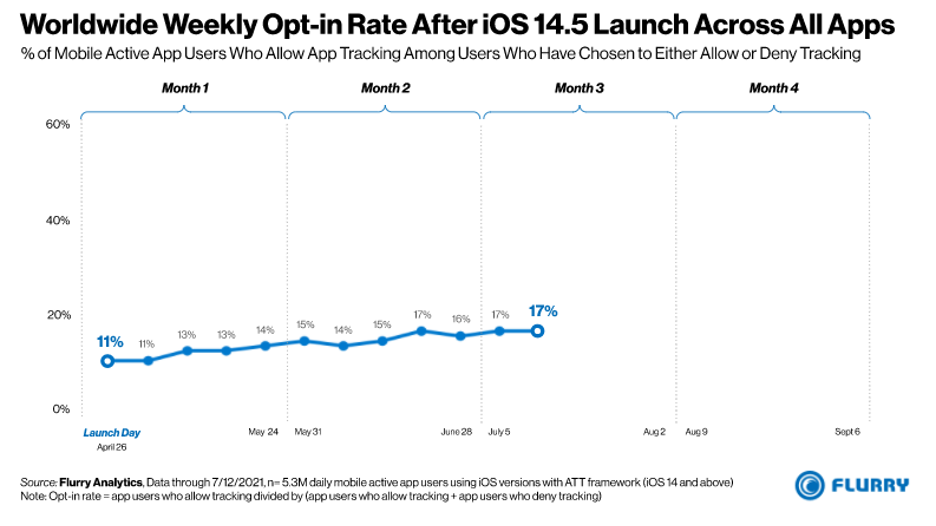
How iOS 14.6 Impacts Facebook Advertising
Before we knew what opt-in rates would really be like back in January 2021, Facebook, advertisers, and our clients had to begin preparing for the upcoming iOS 14 launch. Facebook shared that those advertisers who optimize, target and report on web events, were expected to be impacted by limitations on data sharing in 3 ways:
- New limit on web events
- Audience sizes may decrease
- Some campaign results will be counted differently (Simply put – changes to reporting)
Knowing that the adoption rate of iOS 14.5 was a slower process, it makes sense now why there was not an immediate impact in platform functionality until early June 2021 when iOS 14.6 adoption ramped up. For the new limit on web events, this was something that had already been introduced in January 2021.
1. New Limit on Web Events (and other Account Maintenance)
Given the new limits around events, pixels and click attribution, proactive changes had to be made to ad accounts to ensure that the requirements were met. This included prioritizing the events we were tracking to the most critical 8 events, ensuring all domains were verified and preparing for shorter attribution windows (from 29-day click to 7-day click).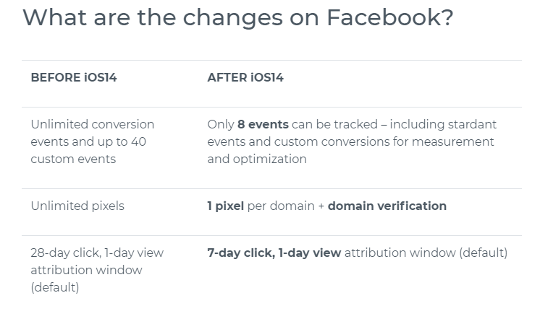
2. Audience sizes may decrease
Decreases in audience sizes primarily affected remarketing campaigns. These campaigns target Custom Audiences that track landing page visitors or website visitors. These audience sizes decrease as more users opt-out of tracking.
One workaround here is to consolidate your audiences and reduce the number of ad sets within your campaign to increase the audience reach.
3. Changes to Reporting
If a user opts out of tracking, Facebook no longer supports delivery and action breakdowns, such as age, gender, region, and placement for both app and web conversions.
Now, conversion data is getting grouped into an “unknown” bucket when you apply one of these data breakdowns above.
Now we must leverage softer metrics to determine performance such as total clicks, click-thru-rate, cost-per-click instead of bottom-funnel metrics such as leads and custom conversions.
The chart below demonstrates (across a couple of different brands), how conversion reporting by age was impacted after the iOS 14 release.
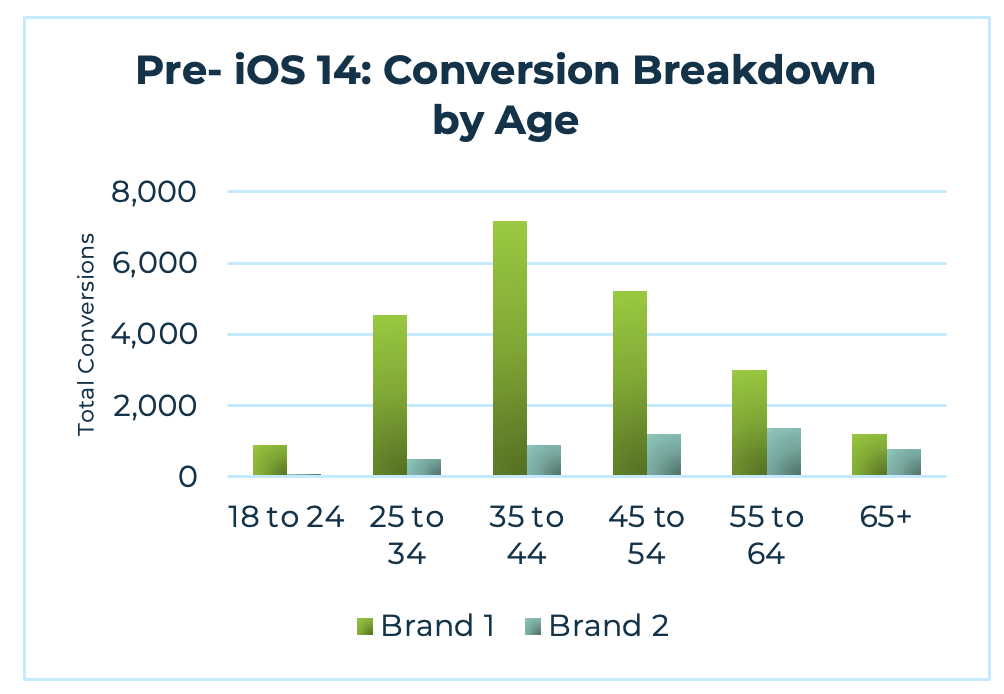
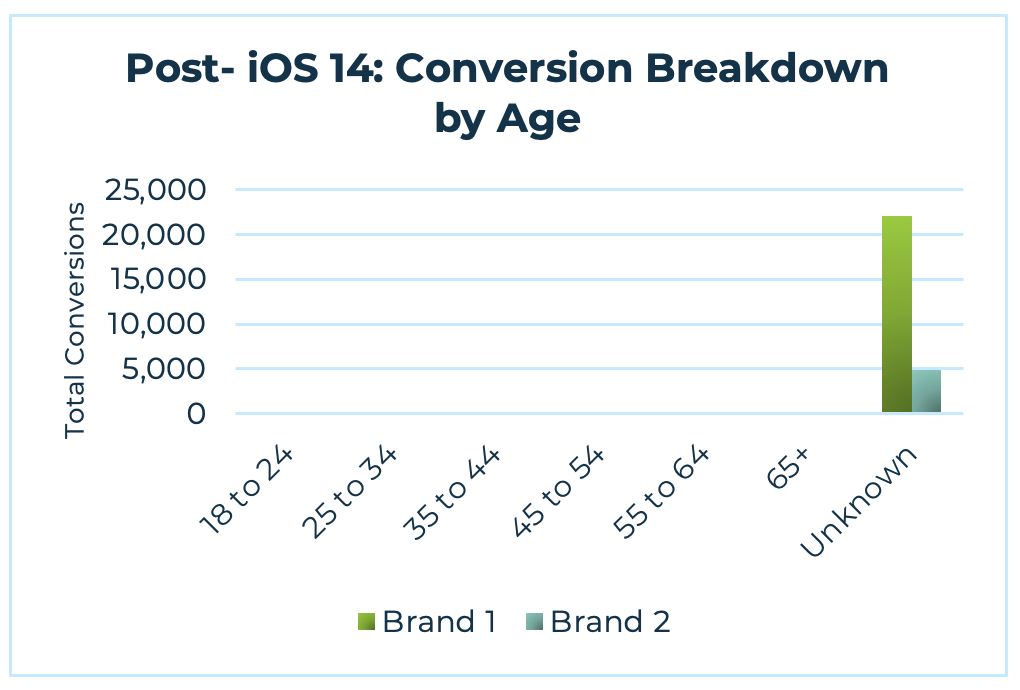
What to do now?
3 Ways to Move Toward Privacy-Centric Advertising
- Leverage Your First-Party CRM Data
- First-party data is highly valuable because of its quality. Because you collect it directly from the source, you know it’s accurate, and because it comes straight from your audience, you know it’s relevant to your business.
- Another benefit of first-party data is that privacy concerns surrounding it stay minimal because you know exactly where it came from and, as the marketer who collected it from your audience, you own it.
- Implement Facebook Conversions API tool
- The Conversions API is designed to help advertisers drive the outcomes they want by connecting businesses’ data (CRM, sales platforms, etc.) to Facebook, enabling more accurate tracking across the customer journey.
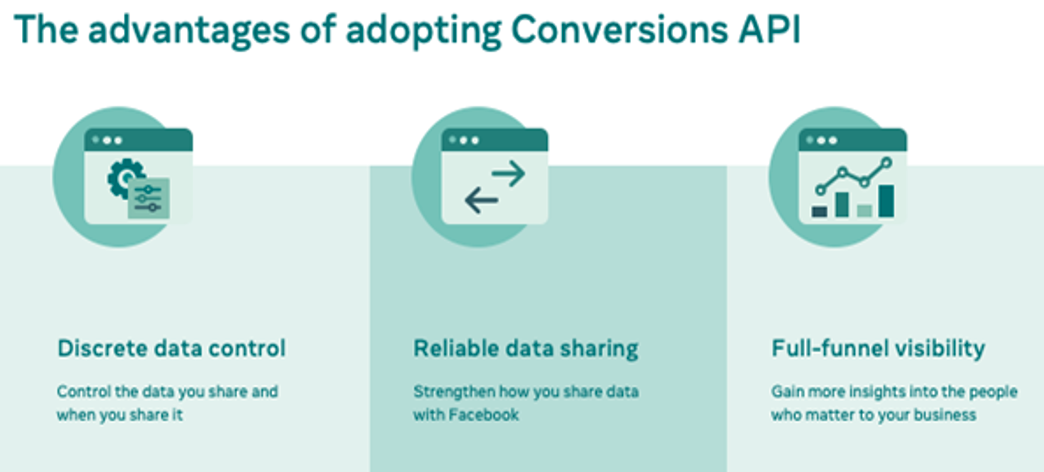
As the industry moves to better protect the privacy of consumers, browsers will cease to support certain mechanisms that today aid in optimization, targeting and measurement, such as cookies. Conversions API supports advertisers’ efforts to provide consumers with appropriate data transparency and control while also helping them to continue providing personal experiences.
- Provide Real Value Across the Consumer Journey
- Businesses will have to create a strong value exchange of users’ consent of their data for relevant content. In a cookie-less world, this means moving on from passive data collection and instead providing real value across the consumer journey, treating data respectfully once it’s collected. Loyalty programs, discounts, VIP experiences, sneak peeks or rewards are just some of the ways advertisers can offer value.
- “As mechanisms like cookies and mobile device IDs become less available, brands will come to rely on other pieces of information, such as customer email addresses and phone numbers,” says Jan Hofmann-Cassiani, a Facebook product marketing manager based in APAC. “This is information that people have to feel comfortable sharing, which means businesses should take steps to provide value across the consumer journey and treat data respectfully. If people share information with your business, it should be because they see clear and genuine value in sharing.”
Need help managing and optimizing your Facebook campaigns?
Bold Orange has deep expertise in managing Facebook Advertising campaigns across a variety of verticals. For detailed analysis and advice on your existing campaigns, don’t hesitate to reach out.


